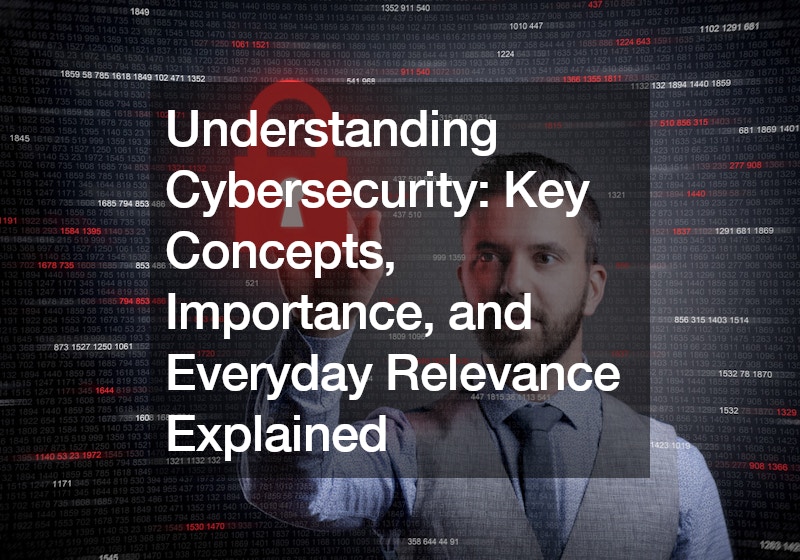In our increasingly interconnected world, the importance of cybersecurity extends far beyond organizational concerns and permeates every aspect of our daily lives. As we navigate a digital landscape rife with opportunities and threats, comprehending the significance of cybersecurity becomes paramount for individuals and communities alike.
Key Concepts of Cybersecurity
At the heart of cybersecurity lie the fundamental concepts of asset protection, threat mitigation, and risk management. These principles form the bedrock upon which effective cybersecurity strategies are built.
Assets, encompassing information, data, devices, networks, and services, constitute the lifeblood of our digital existence. Safeguarding these assets is not merely a matter of organizational security but a collective responsibility shared by individuals in our interconnected society.
One must distinguish between the terms cybersecurity and information security to grasp the nuanced landscape of digital protection fully. While cybersecurity specifically targets the defense of digital data and systems, information security casts a wider net, encapsulating the safeguarding of information in various forms, including both digital and physical manifestations.
Importance of Cybersecurity in Everyday Lives
The prevalence of technology in our daily routines underscores the critical role that cybersecurity plays in safeguarding our personal information and digital interactions. From online banking to social media engagement and smart home devices, our lives are intricately woven into the digital fabric. The compromise of our digital assets could have cascading effects, leading to financial losses, privacy breaches, and even identity theft.
Consider the routine act of online shopping–a practice embedded in the daily lives of millions. Without robust cybersecurity measures in place, the personal and financial information shared during an online transaction becomes vulnerable to exploitation by cybercriminals. Instances of credit card fraud, unauthorized access to accounts, and the compromise of sensitive data underscore the real-world consequences of lax cybersecurity practices.
Similarly, the advent of smart homes has brought convenience and efficiency but also introduced new avenues for potential cyber threats. Smart devices, from thermostats to security cameras, are interconnected through networks, creating potential entry points for cybercriminals. The compromise of these devices not only poses a threat to privacy but could also lead to the exploitation of personal spaces.
In the realm of healthcare, the digitization of patient records exemplifies the intersection of cybersecurity with our everyday well-being. Cybersecurity ensures the protection of electronic health records, guarding against unauthorized access and potential manipulation of critical medical information. The compromise of such data not only jeopardizes individual privacy but also raises concerns about the integrity of healthcare services.
Mitigating Risks and Navigating Cyber Threats
Understanding the multifaceted nature of cybersecurity risks is crucial for individuals seeking to navigate the digital landscape securely. Cyber threats come in various forms, ranging from phishing attacks and malware infections to more sophisticated tactics employed by cybercriminals. By staying informed about prevalent threats and adopting best practices, individuals can bolster their personal cybersecurity defenses. For example, in the event of identity theft, it’s imperative to know how should you respond to the theft of your identity, like immediately report the incident to relevant authorities and financial institutions, while also taking proactive steps to mitigate further damage and protect one’s personal information.
Practical steps such as regularly updating software, using strong, unique passwords, and exercising caution when clicking on links or downloading attachments go a long way in mitigating common cyber threats. Additionally, cultivating a mindset of cybersecurity awareness–being attuned to potential risks and proactively taking steps to address them–forms an essential part of our collective defense against cyber threats.
Furthermore, working with experts from IT services Bethesda that monitor your services 24/7, can add an extra layer of security, offering peace of mind and proactive support to keep your operations running smoothly and free from cyberattacks.
Governmental Support and Educational Resources
Recognizing the need for widespread cybersecurity literacy, governments and cybersecurity organizations provide invaluable support and educational resources. The National Cyber Security Center (NCSC), for instance, serves as a central hub for cybersecurity guidance, offering practical insights into securing digital systems and staying abreast of emerging threats.
Governmental bodies such as the Center for National Protective Security Authority and the National Cyber Crime Unit extend support to individuals and organizations alike. From threat intelligence sharing to incident response coordination, these entities contribute to the overall resilience of our digital ecosystem.
Emerging Technologies and Cybersecurity Challenges
As technological innovations continue to redefine the digital landscape, new cybersecurity challenges emerge. The proliferation of Internet of Things (IoT) devices, artificial intelligence (AI), and cloud computing presents both opportunities and risks. While these technologies offer unparalleled convenience and efficiency, they also introduce new vectors for potential cyber threats.
Securing IoT devices, for instance, poses a significant challenge due to their often limited computational capabilities and lack of robust security features. Vulnerabilities in IoT devices could be exploited by cybercriminals to gain unauthorized access to networks or launch distributed denial-of-service (DDoS) attacks.
Similarly, the integration of AI into cybersecurity defenses heralds a new era of adaptive and proactive threat detection. However, AI-powered attacks, such as adversarial machine learning and AI-generated phishing scams, pose novel challenges for traditional cybersecurity defenses.
The migration of data and services to cloud-based platforms introduces additional considerations for cybersecurity. While cloud computing offers scalability, flexibility, and cost savings, it also necessitates robust measures to protect sensitive data from unauthorized access or data breaches.
Conclusion: A Secure Digital Future
In conclusion, the understanding of cybersecurity is not confined to boardrooms and organizational strategies–it is a knowledge essential for every individual navigating the digital landscape. The importance of safeguarding our digital assets, from personal information to critical healthcare records, underscores the broader relevance of cybersecurity in our daily lives. By embracing cybersecurity best practices, staying informed about emerging threats, and leveraging available resources, we collectively contribute to a safer and more secure digital future. As we continue to embrace technological advancements and navigate the evolving threat landscape, the role of cybersecurity in safeguarding our digital well-being remains indispensable.
.




